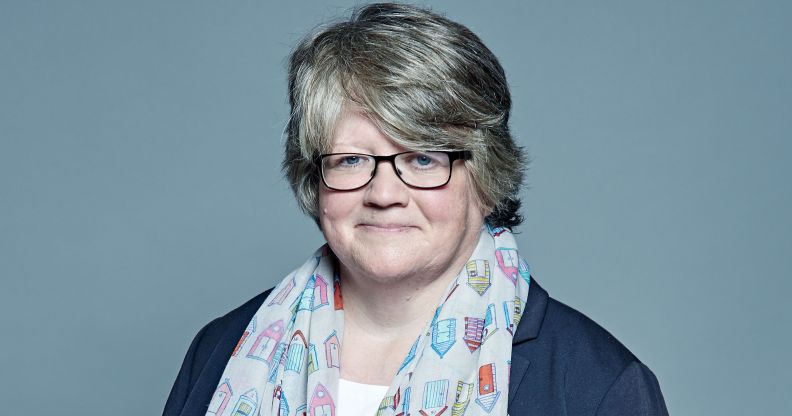Cabinet shifts against LGBT rights as Therese Coffey replaces Amber Rudd

Therese Coffey has been promoted to the Cabinet, replacing Amber Rudd
Boris Johnson has promoted Thérèse Coffey, an MP with an anti-LGBT record, to serve in his Cabinet – meaning a majority of his top team are now MPs who opposed equal marriage.
The PM was forced to make changes to his Cabinet after Secretary of State for Work and Pensions and Minister for Women and Equalities Amber Rudd quit and resigned from the Conservative Party.
MP for Suffolk Coastal Thérèse Coffey has been named the new work and pensions secretary, but she will not take on the role of equalities minister – likely due to her views on LGBT+ rights.
The new equalities minister is yet to be announced at time of publication.
More than half of Cabinet opposed equal marriage
Coffey’s promotion continues the Cabinet’s shift towards opponents of LGBT+ rights.
For the first time since equal marriage passed in 2013, more than half of the Cabinet have a record of opposition to same-sex marriage, with significantly more opponents than under Theresa May and David Cameron.

More than half of Boris Johnson’s Cabinet members opposed same-sex marriage
Other strong opponents of LGBT+ equality including Jacob Rees-Mogg and Priti Patel have key jobs under Johnson.
Therese Coffey has anti-LGBT record
In July, Coffey was one of just 73 MPs who voted against extending equal marriage to Northern Ireland, in the absence of a devolved government in the region.
She also strongly opposed the introduction of same-sex marriage in England and Wales in 2013, and was part a cabal of 15 MPs who publicly urged the House of Lords to block the legislation after it won overwhelming support in the Commons by a vote of 395-170.
In a letter to peers, Coffey urged them “in the strongest terms” to block the bill, claiming that the government was introducing same-sex marriage “without any mandate.”
She wrote: “None of us was elected on a platform to redefine marriage. Genuine concerns about the impact on society’s understanding of marriage and the Bill’s implications for free speech and civil liberty have been swept aside.”
The letter claimed: “Our postbags testify to the deep unpopularity of the Bill. Most of our constituents simply believe marriage is a unique institution that forms the bedrock of society and should be left as it is.”
In her speech to the Commons at the time, she said: “Marriage involves special provisions, such as support for the family and the procreation of children.
“Of course that is not the case for all families, for various reasons, but I nevertheless think those provisions are too important to be tampered with in rushed legislation that has not been subject to adequate consultation.”
Coffey also vowed to “fight” against mandatory sex and relationship education in schools, branding them “the wrong thing for this country,” adding: “It is imperative that parents continue to be able to exercise the right to withdraw their children from lessons that they do not believe to be in their children’s interests.”

